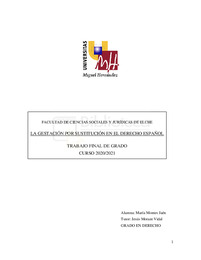Please use this identifier to cite or link to this item:
https://hdl.handle.net/11000/25824Full metadata record
| DC Field | Value | Language |
|---|---|---|
| dc.contributor.author | Montes Jaén, María | - |
| dc.contributor.other | Departamentos de la UMH::Ciencia Jurídica | es_ES |
| dc.date.accessioned | 2022-02-08T07:55:32Z | - |
| dc.date.available | 2022-02-08T07:55:32Z | - |
| dc.date.created | 2020-12 | - |
| dc.identifier.uri | http://hdl.handle.net/11000/25824 | - |
| dc.description.abstract | La gestación por sustitución es una práctica que se ha ido ejerciendo en países como EEUU, Rusia, Portugal, Grecia, Reino Unido y Ucrania, que afecta directamente a la maternidad y filiación. En nuestro país es un procedimiento que no está legalizado, pero ello no impide que tenga lugar por ciudadanos españoles en otros países, cosa que suscita múltiples problemas legales al encontrarnos con ellos en nuestro territorio como es la inscripción en el registro civil de los menores nacidos fruto de un contrato de gestación por sustitución. En estas situaciones nos encontramos con intereses contrapuestos además del interés superior del menor, la libertad de la mujer, su dignidad en el sentido de la disposición y el uso de su cuerpo. En definitiva, con este trabajo se pretende analizar los problemas que suscita la gestación por sustitución en nuestro ordenamiento jurídico y a su vez comparar la normativa española con la de otros países de nuestro entorno donde sí es una técnica legalizada | es_ES |
| dc.description.abstract | The surrogacy is a practice that has been exercising in countries like USA, Canada, Russia, Georgia, Greece, United Kindom and Ukraine, that affects directly to maternity and filiation. In our country, it is a non-legalised procedure. However, this does not prevent from Spanish citizens in other countries, which arouses multiple legal problems when we merge with them in our territory as the registration in the civil registry of the underage born from a surrogacy contract. In these situations we find opposed interests beside the superior interest of the minor, the woman freedom, their dignity in the willingness sense and the use of their body. In conclusion, with this work, it is expected to analyze the problems that provoke the surrogacy in our legal system and, at the same time, compare Spanish legislation with those from other countries of our surroudings where it is indeed a legal technique | es_ES |
| dc.format | application/pdf | es_ES |
| dc.format.extent | 56 | es_ES |
| dc.language.iso | spa | es_ES |
| dc.publisher | Universidad Miguel Hernández de Elche | es_ES |
| dc.rights | info:eu-repo/semantics/openAccess | es_ES |
| dc.rights | Attribution-NonCommercial-NoDerivatives 4.0 Internacional | * |
| dc.rights.uri | http://creativecommons.org/licenses/by-nc-nd/4.0/ | * |
| dc.subject | gestación subrogada | es_ES |
| dc.subject | gestación por sustitución | es_ES |
| dc.subject | maternidad | es_ES |
| dc.subject | filiación | es_ES |
| dc.subject | surrogacy | es_ES |
| dc.subject | maternity | es_ES |
| dc.subject | filation | es_ES |
| dc.subject.other | CDU::3 - Ciencias sociales::34 - Derecho | es_ES |
| dc.title | La gestación por sustitución en el derecho español | es_ES |
| dc.type | info:eu-repo/semantics/bachelorThesis | es_ES |

View/Open:
TFG-Montes Jaén, María.pdf
969,1 kB
Adobe PDF
Share:
.png)
